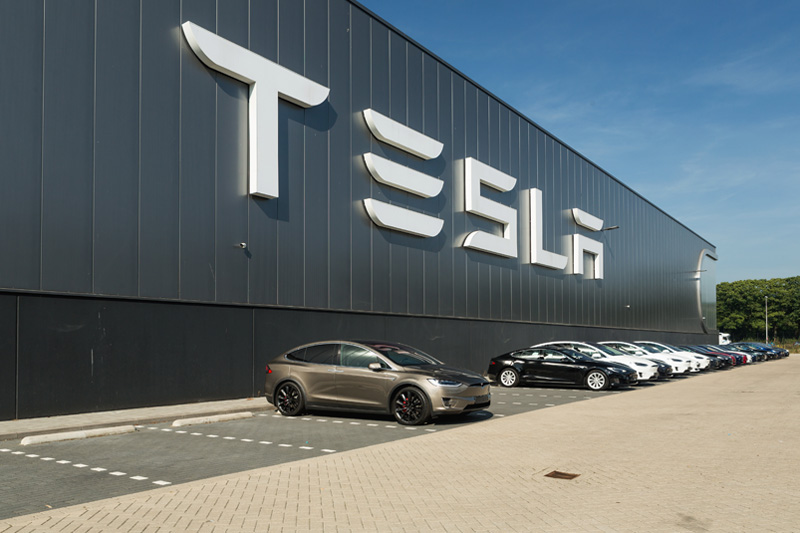This post was originally published on this site
https://i-invdn-com.investing.com/trkd-images/LYNXMPEJ190UB_L.jpg
(Reuters) – Tesla (NASDAQ:TSLA) CEO Elon Musk has often talked about opening his Supercharging network to competitors, but has never actually done so in the United States, where the company dominates the electric vehicle market.
Now, the brash CEO may have 7.5 billion reasons to accelerate those plans.
The Department of Transportation next week is expected to finalize a requirement that will pressure Tesla to expand beyond its proprietary charging equipment in the U.S. and add the charger used by its competitors, administration officials tell Reuters.
Otherwise, the carmaker will be left out of the $7.5 billion in subsidies flowing out of Washington, part of President Joe Biden’s plan to blanket the nation with 500,000 EV chargers in the coming years, up from 100,000 in 2021.
The network is a central part of Biden’s plan to tackle climate change by converting 50% of all new U.S. vehicle sales to electric by 2030. A dearth of chargers on U.S. roads has slowed the growth of EV sales and the positive environmental impact, advocates say.
As the U.S. pressure builds, there are plenty of signs that Tesla is on the brink of democratizing its network, even though Musk has denounced the federal government’s involvement before.
In January of last year, Tesla wrote the Federal Highway Administration, offering the Biden administration suggestions on how to shape the charging program. In Ohio, the company responded to a recent request that companies submit charging proposals, state officials told Reuters. In Arizona, the company told the state it was open to upgrading its chargers or building new ones to meet the federal requirements, although a final decision was not made.
Musk met with White House officials last month in Washington D.C. Among the items discussed was EV charging program, White House infrastructure czar Mitch Landrieu told reporters.
Musk, for his part, said in a July 2021 earnings call that the point of Tesla’s charging network was “not to create a walled garden and use that to bludgeon our competitors,” but has not publicly discussed plans for U.S. market changes. The company has opened up some Superchargers in Europe and Australia.
An email to Tesla and Musk was not returned.
State officials are optimistic.
“We do understand that Tesla is looking to tweak their system to be more open access. So, if they do reach that point and meet those eligibility requirements, they certainly will be eligible for funding,” said Stuart Anderson, the state of Iowa’s Transportation Development Division Director.
SUPERCHARGER DOMINANCE
Tesla’s U.S. Supercharger network is often held up as the gold standard: fast, reliable, and plentiful, with about 40,000 chargers worldwide.
But for years, the network has been exclusive to Tesla owners, thanks to a plug that connects only to Tesla cars, meaning someone driving a Volkswagen (ETR:VOWG_p), Ford, or Chevy vehicle wouldn’t be able to use it.
Tesla drivers can purchase an adapter to connect with the U.S. standard “Combined Charging System” or CCS chargers but people who don’t own a Tesla can’t do the same with Superchargers.
Opening up its networks could grow a funding and revenue stream for Tesla, but could erode the brand’s exclusivity and make it challenging for the automaker to manage the network, analysts say.
“It’s definitely a balance for them: how much potential federal subsidies for expanding their network versus maintaining that competitive advantage on charging,” Chris Harto, a Senior Policy Analyst at Consumer Reports said.
The Department of Transportation next week will detail final requirements that all electric vehicle chargers must meet to be eligible for funding under the $7.5 billion effort to electrify highways and interstates across the nation. Those requirements will also touch on cybersecurity and how much and what parts of the charger must be made in America.
Chargers seeking to become part of the National Electric Vehicle Infrastructure (NEVI) program must utilize a combined charging system, or CCS, the standard in the U.S. on nearly all charging stations except Tesla’s popular Superchargers.
The move to finalize so-called ‘minimum standards’ by the administration is expected to unlock the first wave of funding and set off fierce competition among companies like ChargePoint Holdings and and EVgo Inc. For these small companies, it represents a generational opportunity.
Any charger that wants to be eligible for federal dollars will have to meet the CCS standard once the rules are finalized next week, administration officials told Reuters.
Last year, Tesla offered up another idea. In its letter to the FHA, the company proposed that its Superchargers should qualify for rebates if they are co-located with CCS chargers that work with competitors.
An administration official told Reuters that request was not seriously considered.

